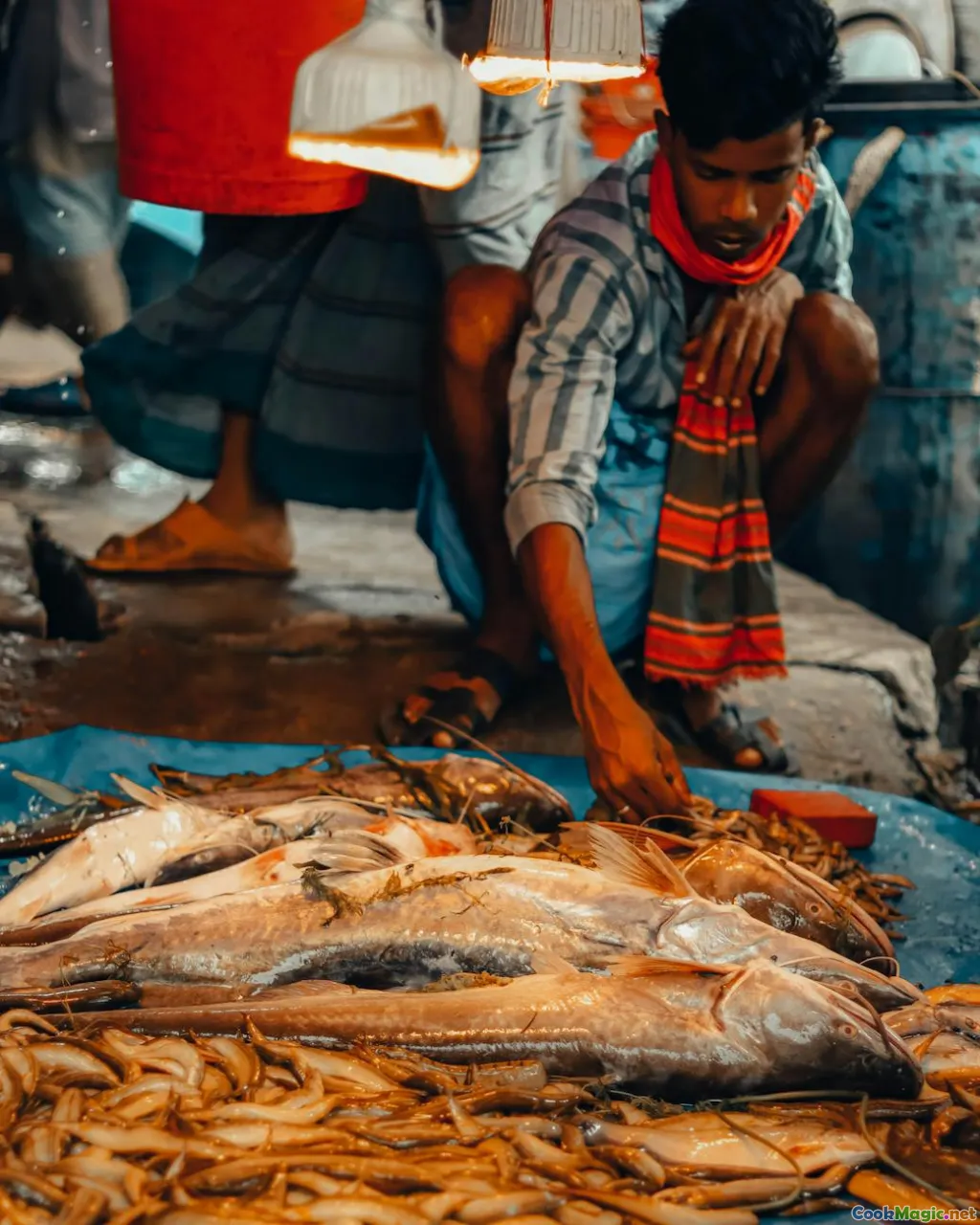Regional Variations in Bangladeshi Fish Curry Recipes
8 min read Explore the diverse regional fish curry recipes of Bangladesh, uncovering cultural nuances, unique ingredients, and cooking techniques across the country. May 01, 2025 14:55
Regional Variations in Bangladeshi Fish Curry Recipes
Bangladesh, a land woven with rivers, ponds, and lush wetlands, is a fish lover's paradise. With over 700 species of freshwater fish and an abundance of aquatic resources, fish is not just a staple but a cultural and emotional cornerstone of Bangladeshi life. Imagine waking up to the aroma of simmering fish curries, the vibrant colors of spices blending with the natural hues of fresh catch, and the stories that each regional recipe carries across generations.
In this article, we will embark on a flavorful journey through Bangladesh's diverse regions, exploring how geography, history, and local ingredients shape unique fish curry recipes. From the coastal shores of Khulna to the fertile lands of Mymensingh, each area offers a distinct culinary narrative that reflects its environment and cultural identity.
The Cultural Significance of Fish in Bangladesh
Fish is more than an everyday meal in Bangladesh—it's a symbol of sustenance, community, and tradition. Historically, the country’s extensive river networks made fishing a vital livelihood, and over centuries, local communities developed specialized recipes that highlight regional flavors.
Eating fish is often associated with family gatherings, religious festivals, and social bonding. The act of preparing and sharing fish curries strengthens communal ties, and each recipe tells a story of local history, resources, and personal memories.
Regional Diversity in Fish Curry Preparation
The diversity of Bangladesh’s landscape directly influences its fish curry styles. Coastal regions, riverine plains, and deltaic zones each lend their unique ingredients, cooking techniques, and flavors. Let’s explore these regions in detail.
Coastal Khulna and Satkhira: Spicy, Tangy, and Rich
Key Features
The southwestern coastal belt, including Khulna and Satkhira, boasts an extensive mangrove ecosystem and access to the Bay of Bengal. Here, fish curries are characterized by bold spices, tangy tamarind, and often incorporate coconut.
Signature Dish: Panta Ilish with Malai Curry
Ilish (hilsa) fish, revered as the national fish of Bangladesh, is a staple here. The preparation involves lightly frying the fish and serving it with a rich coconut milk-based gravy infused with turmeric, green chilies, and a splash of tamarind for acidity. The dish is often accompanied by fermented rice (panta) during festivals.
Sensory Experience
The aroma of toasted spices mingles with the sweet scent of fresh hilsa, while the gravy’s velvety texture coats each piece, delivering a harmonious blend of heat, sourness, and creaminess. The fiery tang of tamarind awakens the palate, and the tender fish melts in your mouth.
The Riverine Heartland: Mymensingh and Jamalpur – Subtle, Aromatic, and Homey
Key Features
The central plains, characterized by vast rivers like the Brahmaputra and Jamuna, favor simpler, more aromatic preparations. Fish here is often cooked with minimal spices to highlight the natural flavors.
Signature Dish: Begun Bharta with Fish Curry
A common recipe involves cooking small freshwater fish such as Pabda or Bhetki in a light turmeric and onion gravy, often served alongside mashed eggplant (begun bharta). The focus is on delicate flavors and tender fish.
Sensory Experience
The subtle aroma of freshly ground spices combined with the earthy sweetness of roasted eggplant creates a comforting, home-style dish. The fish remains moist and flaky, with flavors that evoke nostalgia and warmth.
The Eastern Lowlands: Sylhet and Chittagong – Aromatic, Spicy, and Herbal
Key Features
This region, influenced by proximity to India and Southeast Asia, boasts a vibrant culinary culture. Fish curries here often include fragrant herbs, mustard seeds, and a touch of coconut.
Signature Dish: Shorshe Ilish (Hilsa in Mustard Sauce)
This iconic dish features hilsa cooked in a pungent mustard paste with green chilies and turmeric. Sometimes, a splash of mustard oil adds depth.
Sensory Experience
The sharpness of mustard balances the oily richness of hilsa, creating a complex flavor profile. The aroma of mustard seeds and fresh herbs invigorates the senses, and the tender fish absorbs the spicy, tangy sauce perfectly.
The Northern and Western Regions: Rajshahi and Khulna – Earthy, Robust, and Hearty
Key Features
Known for their resilience and agricultural abundance, these regions prefer hearty, robust flavors. Fish curries often incorporate local vegetables and are cooked slowly to develop rich flavors.
Signature Dish: Chingri Malai Curry (Prawn Coconut Curry)
While prawns are common, freshwater fish like Magur (Walking catfish) are also used, simmered with coconut milk, cloves, cinnamon, and local spices.
Sensory Experience
The creamy coconut gravy envelops the fish, releasing a fragrant aroma of spices and herbs. The slow cooking process yields tender, flavorful fish that evokes a sense of home and tradition.
Personal Insights and Reflections
Growing up in Bangladesh, I’ve witnessed how each region’s fish curry reflects its environment and history. My grandmother’s kitchen in Mymensingh was filled with the gentle aroma of turmeric and onions, where she masterfully prepared Pabda fish with a delicate touch. In contrast, my uncle in Satkhira would spend hours preparing hilsa in fiery tamarind gravy, a dish that embodies the coastal spirit.
These recipes aren’t just food—they are stories, memories, and cultural identity passed down through generations. They evoke emotions, connect communities, and celebrate the diversity of Bangladesh’s gastronomic landscape.
Conclusion
The regional variations in Bangladeshi fish curry recipes offer a rich tapestry of flavors, techniques, and cultural narratives. Whether it’s the spicy tang of coastal hilsa, the subtle aroma of central river dishes, or the aromatic herbal notes of the east, each region contributes its unique voice to Bangladesh’s culinary symphony.
Next time you indulge in a fish curry from Bangladesh, remember—you're tasting centuries of tradition, geography, and love simmered into every dish. Dive into these flavors, explore their stories, and celebrate the vibrant diversity of Bangladeshi cuisine.
Happy cooking and tasting!









